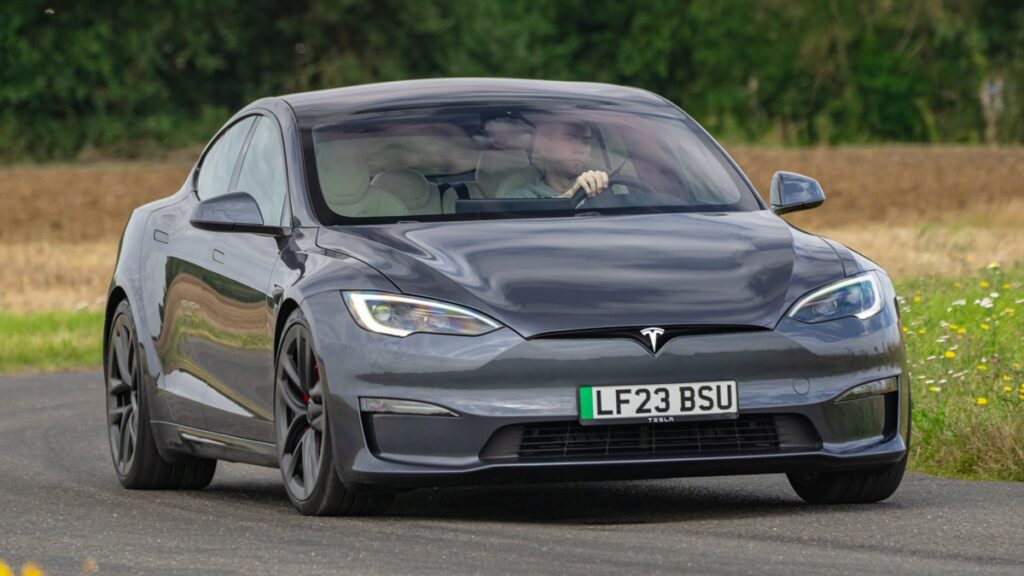Artificial intelligence has permeated almost all aspects of human endeavours, and the impact it has made on the automotive sector is undeniable. Over the years, AI in cars has moved from being an impossible futuristic concept to a reality, revolutionizing driver experience and automotive power.
These days, Cars are becoming intelligent, networked machines with self-driving, intelligent safety systems, predictive maintenance, and personalized experiences. This integration of AI in cars advances beyond basic automation, enabling more secure and efficient transportation.
Below are some cars that have been heavily equipped with AI in 2025.
Tesla Model S
Tesla has integrated AI-powered features into its Model S, including Autopilot, a neural network that processes data from sensors, and Smart Air Suspension. The Autopilot system uses cameras, radar, and ultrasonic sensors to improve driving functions like lane-keeping and self-parking. The model also features an adaptive air suspension system that adjusts ride height and damping settings based on road conditions. The GPS navigation system learns driver preferences and provides real-time updates on charging station locations. The Tesla app allows remote control and monitoring of the vehicle, allowing users to check the car’s status, adjust climate settings, and summon it from a parking space.

Audi e-Tron
The Audi e-Tron is equipped with several AI-driven technologies to improve efficiency, safety, and the driving experience. These include a predictive efficiency assistant that uses GPS, cameras, and sensors to assess road conditions, adaptive cruise control that analyzes traffic patterns, and a virtual cockpit that adapts to the driver’s preferences.

The e-Tron also features voice recognition, allowing drivers to control functions hands-free, and driver assistance systems like lane departure warnings, automatic emergency braking, and blind spot monitoring. These features enhance the driving experience and provide additional safety features.
Hyundai Kona Electric
Hyundai has integrated several AI-powered technologies into the Kona Electric to improve safety, convenience, and efficiency. These include Smart Cruise Control (SCC) with Stop & Go, BlueLink Connected Car Services, Driver Attention Warning (DAW), Rear Cross-Traffic Collision Warning (RCCW), and Lane Keeping Assist (LKA).

SCC maintains a safe distance from the vehicle ahead, adjusts speed based on traffic flow, and provides visual and auditory alerts if signs of drowsiness or inattention are detected. RCCW detects approaching vehicles from the rear and alerts the driver to avoid collisions. LKA monitors the vehicle’s position within the lane and issues visual and audible warnings if it drifts out of its lane.
Polestar 2 EV
The Polestar 2 EV has a number of AI-powered features that increase vehicle efficiency, safety, and driver convenience. These include Predictive Weather for real-time alerts and guidance, Over-the-Air Updates for continuous improvements without the need to visit the dealership, Pilot Assist for semi-autonomous driving, Google Assistant for voice-activated controls, and Driver Awareness Monitoring for identifying distractions or fatigue.

Enhancing driving safety and guaranteeing a more comfortable driving experience, these technologies assist in maintaining a safe driving distance, staying in the center of the lane, and providing real-time notifications regarding hazardous weather conditions.
Ford Mustang Mach-E
Ford has introduced several AI-driven technologies in the Mustang Mach-E including Intelligent Range, Ford Co-Pilot360, Next-Generation SYNC, Phone As A Key, and Active Park Assist 2.0. Intelligent Range analyzes traffic conditions and driving habits to provide accurate range estimates and suggest efficient routes.

Co-Pilot360 features Adaptive Cruise Control, Lane Centering, and Speed Sign Recognition to detect pedestrians, other vehicles, and road signs. The SYNC infotainment system learns and adapts to the driver’s voice commands and preferences for an intuitive experience. Phone As A Key allows the driver to use their smartphone as a virtual key for secure authentication and communication.




